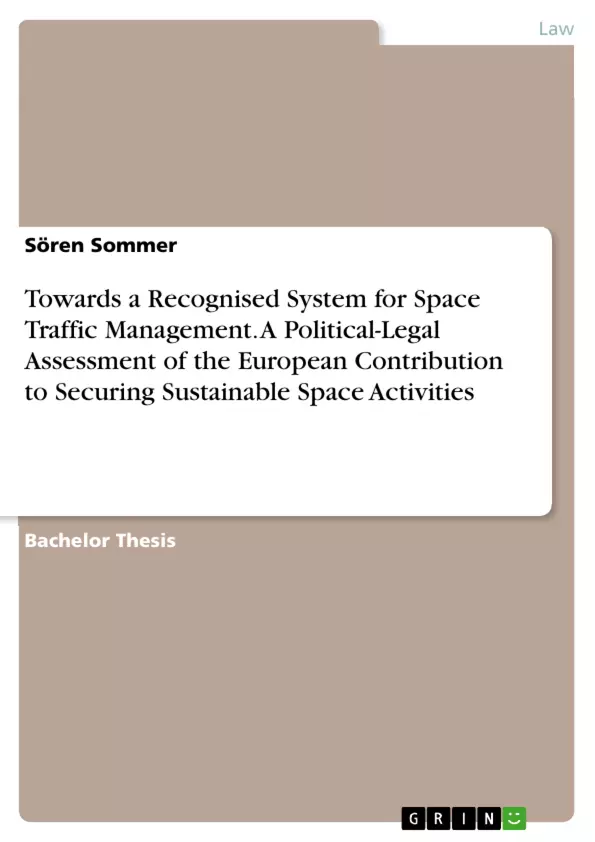This thesis focuses on the research questions whether Europe can legally and technically contribute to Space Traffic Management, how it can contribute and lastly if it should contribute.
The first question primarily relates to legal aspects deriving from international and EU law. The second questions assess European capabilities in the field of STM, while the last question discusses Europe's significance to contribute to STM or if maybe the United Nations (UN) or the national statesare more adequate and should contribute solely.
Inhaltsverzeichnis (Table of Contents)
- Introduction
- A picture of outer space - the threat of a system's collapse
- Research questions, purpose, and approach
- Relevance and impact
- State of the art and references
- Space Traffic Management - an overview
- Findings from the International Academy of Astronautics Cosmic Studies on Space Traffic Management
- Contents of Space Traffic Management
- Space Situational Awareness as an important element of Space Traffic Management
- Sharing of information/data collection on Space Situational Awareness, notification system, and real-time collision avoidance
- Traffic rules
- Mechanism for implementation and control
- Space Debris Mitigation
- United States and the JSpOC already providing a de-facto form of Space Traffic Management
- International, national, and European governance over space activities
- The question of sovereignty
- Space as a multilevel governance system
- First governance triangle - EU, ESA and Member States
- The EU-ESA relationship
- Cooperation between EU and ESA
- European Space Operations Centre
- Second governance triangle - EU, ESA and UN
- EU competences and objectives in the field of Space Traffic Management
- EU objectives from international law
- EU competences from EU law
- Arts. 4 III, 189 TFEU (Space)
- Arts. 4 II (g), 90 ff. TFEU (Transport)
- EU and Space Traffic Management
- European activities and capabilities in the field of Space Traffic Management
- European Space Policy
- Code of Conduct for Outer Space Activities
- European Code of Conduct for Space Debris Mitigation
- Space Situational Awareness programme
- Space Surveillance and Tracking Support Framework
- European Union Satellite Centre
- Clean Space Initiative
- The national States
- Europe's particular significance in the field of Space Traffic Management
- Conclusion and Outlook
Zielsetzung und Themenschwerpunkte (Objectives and Key Themes)
This Bachelorarbeit examines the potential for the European Union (EU) to establish a recognized system for Space Traffic Management (STM). It analyzes the politico-legal framework for such a system, focusing on the EU's role in ensuring sustainable space activities.
- The current state of space traffic and the need for a system to manage it
- The legal and political frameworks governing space activities at international, national, and European levels
- The EU's competences and objectives in the field of STM
- Existing European activities and capabilities relevant to STM
- The significance of the EU's contribution to establishing a recognized STM system
Zusammenfassung der Kapitel (Chapter Summaries)
The work begins by outlining the growing threat posed by uncontrolled space traffic, emphasizing the need for a robust STM system. It explores the concept of STM and its key elements, including Space Situational Awareness, data sharing, traffic rules, implementation mechanisms, and space debris mitigation.
Chapter 3 examines the complex governance landscape surrounding space activities, focusing on the multilevel system involving international bodies, national states, and the EU. It delves into the EU's relationship with the European Space Agency (ESA) and the UN, highlighting the relevant competences and objectives in the field of STM.
Chapter 4 analyzes the EU's legal and political framework for STM, drawing from international and EU law. It reviews EU activities and capabilities, such as its Space Situational Awareness programme, the Clean Space Initiative, and the Space Surveillance and Tracking Support Framework.
Finally, the work explores the EU's particular significance in the field of STM, arguing for its central role in developing a globally recognized system.
Schlüsselwörter (Keywords)
The study centers on the legal and political challenges of establishing a system for Space Traffic Management (STM), focusing on the European Union's role and contribution. Key themes include sustainable space activities, international law, EU law, space governance, Space Situational Awareness (SSA), space debris mitigation, and the relationship between the EU and the European Space Agency (ESA).
Frequently Asked Questions
What is Space Traffic Management (STM)?
STM encompasses the rules, technical means, and notification systems required to ensure safe and sustainable space activities, including collision avoidance and debris mitigation.
Can Europe legally contribute to STM?
Yes, the thesis analyzes EU competences derived from international law and EU law (e.g., Arts. 189 and 90 TFEU) that allow for a significant European role in space traffic regulation.
What is Space Situational Awareness (SSA)?
SSA is a critical element of STM that involves tracking objects in orbit and collecting data to prevent collisions and monitor the space environment.
How do the EU and ESA collaborate in this field?
The relationship involves a multilevel governance system where the EU provides political and legal frameworks, while the European Space Agency (ESA) provides technical expertise and operational centers.
What is the threat of a "system's collapse" in outer space?
The increasing amount of space debris and uncontrolled traffic poses a risk that certain orbits could become unusable, leading to a collapse of space-based services.
What is the "Code of Conduct for Outer Space Activities"?
It is a European initiative aimed at establishing voluntary norms to enhance the safety, security, and sustainability of activities in outer space.
- Citation du texte
- Sören Sommer (Auteur), 2017, Towards a Recognised System for Space Traffic Management. A Political-Legal Assessment of the European Contribution to Securing Sustainable Space Activities, Munich, GRIN Verlag, https://www.grin.com/document/489857



